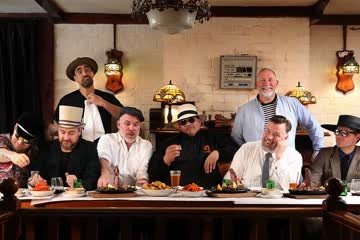Five Of The Worst Decisions In Australian Politics
Regardless of who wins next month’s election, hopefully our stupidest days are behind us.
Aside from the failures of basic humanity that have driven a frightening portion of Australian administrative policy since before Federation, our representatives and governments have also tended to possess a special talent in the fine art of general incompetence*.
You need only look at the news to be bombarded with factional breakdowns, controversies, scandals and criminal overuse of the word “gaffe” – there's no escaping the sensation we're being run by a bunch of children in suits who all have that disease that kid had in Jack that made him look and sound like Robin Williams.
But compared with the politicians of yesteryear, making the decision to speak publicly about Islam when you don't know what you're saying, or to photograph your business in some glassware and send it to your mistress, is vulgar amateurism. This? This is screwing up at its most refined.
5. First Governor-General Declares Worst Possible Candidate Prime Minister

Don't miss a beat with our FREE daily newsletter
It was a simple task: arrive in Australia and pick an interim Prime Minister to tide us over between Federation on January 1, 1901, and the general parliamentary elections in March. Our first Governor-General, the 7th Earl of Hopetoun, handled step one just fine. Step two, however, was a total balls-up.
In what came to be known as the “Hopetoun blunder”, the good Earl selected then-Premier of New South Wales Sir William Lyne to be his No. 1 guy and rock this interim PM thing for a couple months. Lyne was, after all, an experienced politician, and Hopetoun was following British and Canadian precedents in choosing him, so it seemed a solid move.
Only Lyne was seen among his peers as kind of a massive douchebag. He'd been staunchly anti- the whole Federation thing until rather late in the game, by which time he'd managed to piss off his pro-Federation colleagues to the point that they outright refused to join his government and he was pretty swiftly ousted in favour of the much more popular, but still very racist, Edmund Barton. Flying start, no?
4. Australia Moves In, Flips the Neighbours Off and Closes the Blinds

No sooner had Barton taken office as the first Prime Minister of Australia than he started implementation of the White Australia policy, which is exactly what it sounds like.
Aside from being a fundamentally abhorrent piece of legislation, it was also kind of a shot in our own foot, developmentally speaking – instead of opening our arms to our geopolitical neighbours and embarking upon a golden age of cultural discovery, we embraced the idea of the isolated outpost, the far-flung noble bastion of colonial power, and basically pretended like South-East Asia didn't exist, at least as far as immigration prospects were concerned.
Look, racism was obviously around well before White Australia – which stayed in place until 1973 – but the policy basically put the official stamp of approval on xenophobia, and the effect on the nation has been a long-lasting and deeply embedded one.
3. Australia Tries to Exclude a German Hero from Entry
In November 1934, Egon Kisch, a German communist, activist, reporter and fiercely vocal opponent of Adolf Hitler and Nazism, docked in Fremantle with the intention to speak at impending Centenary celebrations. The Lyons government promptly sent representatives aboard to cordially invite Kisch to fuck himself, because he was seen as an undesirable resident of and visitor to anywhere in the Commonwealth on account of all the communism.
But Kisch wasn't going to just take no for an answer. This was “The Raging Reporter from Prague”, a man radicalised by his experience in World War I whose works had gone on to be banned and burnt in Germany. He wasn't afraid of some foppish Australian bureaucrats, so he literally jumped ship in Melbourne in pursuit of solid ground, which he found five metres and a broken leg later.
He was forced back on-board and told he was not welcome. The case caught public attention – the radical journalist and orator who just wanted to warn us about the threat of a second world war and the moustachioed lunatic at its epicentre versus the conservative government who couldn't move past the pinko thing enough to let him do so.
When a judge ordered that Kisch was being held illegally on the ship, mobilising his release, you'd think that would have been the end of it. But no – Lyons and co weren't done. They had one more trick up their sleeve. Under the Immigration Restriction Act of 1901, part of that delightful White Australia policy, visitors could be refused entry if they could not pass a dictation test in any European language.
Kisch was arrested again and forced to take the test in multiple languages until he finally failed – using Scottish Gaelic, which was later found by the High Court to not be a fair language to expect anyone to know; even Scottish Gaelic people. Kisch eventually made his speech to 18,000 people and the Lyons government was left humiliated by the ordeal.
2. Bureau of Sugar Experiment Stations Releases Cane Toads
Frankly, any plan involving the release of durable, foreign, poisonous amphibians into the wild should automatically raise red flags. When this initiative to fight the plague of cane beetles threatening our access to cheap, beetle-free sugar was brought to the table in 1935, somebody must have known there would be a chance it could go wrong.
But whatever, man, they were desperate times, and these were desperate measures and besides, how bad could it even be, really? Well, as you're probably aware, cane toads have since spread from Queensland to NSW, the Northern Territory and all the way across to Western Australia, leaving a trail of devastated ecosystems behind them. So the answer is “pretty fucking bad”.
They eat a bunch of stuff they shouldn't eat, they poison a bunch of animals that shouldn't be eating them, and they've barely done shit about the cane beetle situation. They have generated a pretty profitable market for bored taxidermists with surplus miniature sunglasses and Hawaiian shirts, though.
1. Government Entity Thinks Bribing Saddam Hussein Is a Good Idea
It was only (already) seven years ago, but we can't talk poor foresight without mentioning the Australian Wheat Board (and by implication, Australian government) oil-for-wheat scandal of 2006, which probably trumps every other decision on this list in terms of sheer brazenness and stupidity.
It takes an outrageously gormless group of people to agree on the brilliance of paying kickbacks to one of the world's most reviled regimes – flagrantly contravening Australian law and UN sanctions – in order to secure lucrative wheat contracts. Granted, this was mostly between Iraq wars and the whole deal only came out following the defeat of Hussein's government, but it was all still as shady as balls.
Besides, the simple truth of the matter is, as a citizen of a developed nation, I expect to be able to live free from the risk of my representatives and the bodies for which they are responsible accidentally pissing off a well-armed megalomaniac, regardless of how far away they live. That's what insane people do. They fly off the handle for really irrational reasons, like poor wheat quality. The people behind this decision just did not freaking think it through.
* YES, there have also been some very able people in positions of power but that's not what I'm here to talk about, so don't bother pointing it out. I'm not here to depress you with examples of the best decisions in Australian politics, because then you'd just get upset that our current prospects are much, much worse, so, really, you should be thanking me for reinforcing the idea that, regardless of who wins next month's election, hopefully our stupidest days are behind us.








